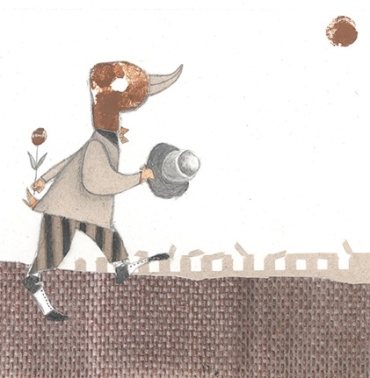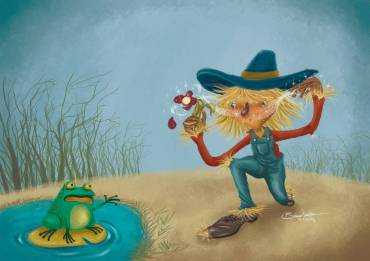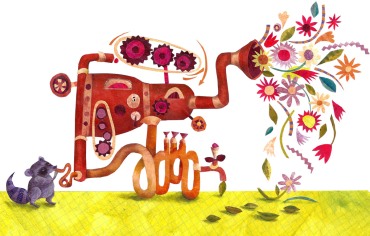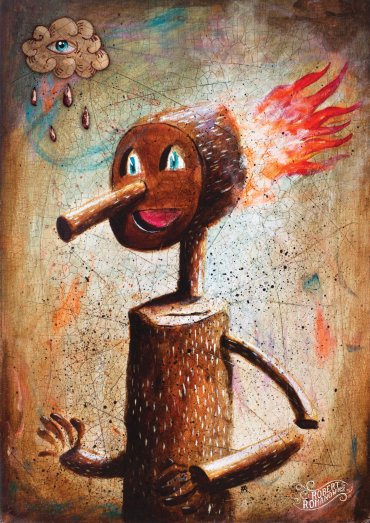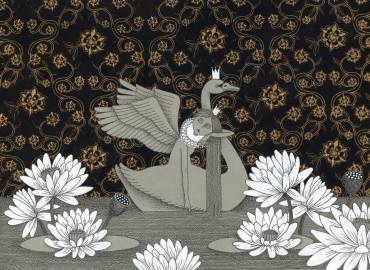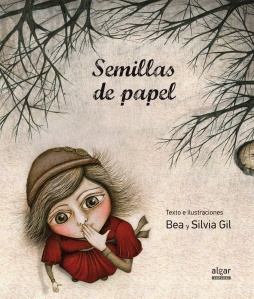 Cuando voy a buscar libros de literatura infantil y juvenil, habitualmente me interesa la editorial, quién lo ha publicado, cuándo, quienes son los autores, pero nunca me dejo influenciar solo por estos datos. Soy escritora de literatura infantil y para mí la historia de un libro es lo más importante, así como el conjunto especial que forma con las ilustraciones. A nosotros, lectores y escritores húngaros, nos gustan las historias largas. Puede ser que por ese motivo todavía no hay tantos álbumes ilustrados en el mercado húngaro de los libros infantiles. No lo sé, pero espero que llegue el tiempo, en que los álbumes ilustrados llegarán a tener mucho éxito como tienen en España o en América Latina. Creo que un álbum ilustrado de calidad tiene un rol muy importante en la literatura infantil. Nos enseña una unión entre el texto y los dibujos, que deben a complementarse. Seguir leyendo
Cuando voy a buscar libros de literatura infantil y juvenil, habitualmente me interesa la editorial, quién lo ha publicado, cuándo, quienes son los autores, pero nunca me dejo influenciar solo por estos datos. Soy escritora de literatura infantil y para mí la historia de un libro es lo más importante, así como el conjunto especial que forma con las ilustraciones. A nosotros, lectores y escritores húngaros, nos gustan las historias largas. Puede ser que por ese motivo todavía no hay tantos álbumes ilustrados en el mercado húngaro de los libros infantiles. No lo sé, pero espero que llegue el tiempo, en que los álbumes ilustrados llegarán a tener mucho éxito como tienen en España o en América Latina. Creo que un álbum ilustrado de calidad tiene un rol muy importante en la literatura infantil. Nos enseña una unión entre el texto y los dibujos, que deben a complementarse. Seguir leyendo
Bea y Silvia Gil: Semillas de papel
Mi blog en el año 2014
Los duendes de las estadísticas de WordPress.com prepararon un informe sobre el año 2014 de este blog.
Aquí hay un extracto:
La sala de conciertos de la Ópera de Sydney contiene 2.700 personas. Este blog ha sido visto cerca de 17.000 veces en 2014. Si fuera un concierto en el Sydney Opera House, se se necesitarían alrededor de 6 presentaciones con entradas agotadas para que todos lo vean.
Mi primer cuento escrito en catalán :-)
Réka Zsuzsanna Simon:
Les bruixes d’Alcolea de Cinca
Es va estirar la foscor. Es va posar la seva casaca llaurada de silenci i va marxar al seu aire. Va fluir pels carrers, es va recolzar delicadament i va acariciar totes les cases. Es van sentir els espetecs dels panys, van començar a espurnejar els llums d’oli. En el sostre d’un taller ocult d’Alcolea de Cinca, dos bruixes esperaven que creixés la llum de la lluna per llançar-se cap al poble.
– A on està la meva escombra? A on? – preguntava iradament la bruixa més lletja.
– Que tens pa a l’ull? No veus que està aquí al teu costat – responia la bruixa menys lletja.
– Em sembla, amiga, que tu ets una panxacontenta. Si jo perdés la meva escombra, s’acabaria la vida nocturna i la nostra malícia de bruixes. No tindríem la possibilitat de marxar volant després de fer patir la gent del poble.
– Tu tens el cap gros – deia la bruixa menys lletja i es va aixecar la seva escombra.
– Cada vegada passa el mateix. Per tot, que passi has de arrencar-te el teus cabells? – deia mentre arreglava el seu pèl llarg i negre com la nit la bruixa més lletja.
Rosi Aragón – Kinga Tóth: Ladrón de la Luna y Chica Chupete
El Proyecto Internacional de Cuentos Allende Los Mares
Traducido por Eszter Kondász, Bettina Susánszki
Revisado por Oscar Godoy
El pato robó la luna, seguro que la robó. La pegó de nuevo al cielo y desde allí nos alumbra, pero él puede quitarla cuando quiera y puede llevársela para sí mismo a su casa. Ni siquiera es una luna, ya que su color es marrón adobe y su cara es redonda tal y como la mía o la tuya. Ni siquiera es una luna, sino una chiquilla sonriente como una manzana silvestre, como el abuelo decía siempre.
Pero, ¿cómo robó el pato la luna? ¿Cómo es que la robó y se la metió en el bolsillo?
El señorito pato se encaminaba al baile, cuando recibió una invitación perfumada: «Aún no tengo a nadie, para que en la fiesta me acompañe. Sea usted tan gallardo y amable, sea mi pareja de baile.» Eso era todo; eso y la fragancia a delicioso chupete de fresa. Al señorito pato le gustó el olor, y no lo le hizo ascos, nada de eso, prefirió ir hacia el lago: «Son las cinco, tengo dos horas más para ponerme guapo, usar gel para que cada fibra de mi plumaje esté reluciente, abrocharme bien la chaqueta y ya todo en orden me voy y ayudo a la Chica Chupete.» –el pato la llamó así para sí mismo. Antes la llamó Olor de Fresa, pero luego pensó que no era apropiado llamarla así, porque iría a bailar un vals con ella y, por tanto, eso no sería una simple pato-fiesta, sino una fiesta elegante.
Arregló su pico, planchó su chaqueta con la ayuda de Mamá Pato porque él mismo no podía hacerlo con mucha habilidad. «Salgo decidido, no hay que ser patoso. Llevaré un chupete de fresa para que me recuerde al perfume y a la que encuentre una chica que huela a fresa, me la llevo.» –decidió el pato que en diez minutos podría llegar al Pato-Salón de Baile donde se celebraba la fiesta, ya que estaba muy cerca. A las siete y media ya hubiera podido dar tres vueltas a la pista de baile, si el rayo de la luna no hubiera alumbrado la calle y si el pato no hubiera elevado sus ojos a la izquierda a dos pasos antes de llegar al salón.
Marcela Calderón – Bálint Korom: El sueño de Gigantito
El Proyecto Internacional de Cuentos Allende Los Mares
Traducido por Eszter Kondász, Bettina Susánszki
Revisado por Oscar Godoy
Érase una vez un elefantillo pequeño, Gigantito, que vivía con sus padres en medio de la jungla. Pasó una vez, por la mañana, que el chillido fuerte de los monos que se columpiaban en las lianas de los árboles altos despertó a Gigantito. Entonces se puso de muy buen humor y, para no quedarse al margen de la diversión, echó a correr para probar él mismo el columpio. Sin embargo, no podía colarse entre los monos para llegar al árbol. Cuando por fin lo consiguió, se agarró valientemente a una liana que se balanceaba hacia él, pero tan pronto como se lanzó, ¡puf! La liana se partió al instante. Los monos se desternillaron burlándose del pobre elefantillo.
Gigantito se quedó sin palabras, aunque estaba terriblemente enrabiado bajó la trompa. Y resolvió por eso mismo que se columpiaría; es más, se buscaría amigos de verdad. Resolvió marcharse hasta que su sueño no se hiciese realidad.
Puso en su zurrón unas galletas elefante, agua y por supuesto heno. Y partió, aunque ni él mismo sabía hacia donde. Iba paseando tras su trompa, cuando en un momento divisó algo terrible. ¡Aparecieron unos ruidosos coches rojos chillando, tocando la sirena porque un bosquecillo estaba ardiendo! Gigantito, ni corto ni perezoso, se apresuró a un lago cercano, sorbió hasta llenar su trompa de agua y fue a rociarla sobre los ardientes árboles. Los bomberos al principio creyeron que quería atizar el fuego, y por eso lo detuvieron, pero luego repararon en su trompa hinchada de agua y, por fin, le dejaron entrar y él valientemente extinguió el incendio. Cuando consiguió extinguir las llamas, Gigantito observó un ratoncito empapado.
Benny Jackson – Károly Méhes: Un cuento pluridimensional
El Proyecto Internacional de Cuentos Allende Los Mares
Traducido por Juanjo Luján Egea
Revisado por Oscar Godoy
Desde que Kitkat empezó a trabajar en la fábrica de Dimensiones indudablemente cambió su manera de concebir el mundo. Él mismo solía decir –como lo hacen los grandes pensadores– que todo era diferente: por ejemplo, que si mirásemos a nuestro alrededor desde el hoyo de la esquina de la parcela vecina, la perspectiva sería totalmente diferente a lo que veríamos si lo hiciésemos desde la ventana de la escuela. Por otra parte ilustraba la complejidad de la vida mediante una red de laberintos increíblemente intrincada. Estos cambios también cobraron validez para los cuentos. Kitkat afirmaba que si en un cuento podía ocurrir cualquier cosa, o todo, pues que así fuera.
–Vamos a fabricar un cuento –dijo un buen día entusiasmado– en el que aparezca la Rana Encantada y …
Aquí se puso pensativo, ya que encontrar la pareja apropiada para algo, eso sí es una de las ciencias más difíciles del mundo.
–¿La Caperucita Roja?–pregunté.
Sólo sacudió la cabeza.
–¿El oso Winnie the Pooh?
Ahora ya frunció las cejas y puso un dedo ante sus labios.
–¡¡Ssshhh!!
Y yo esperé.
Entonces de repente lo dijo.
–El Espantapájaros.
–¡Oh, oh, oh! –grité sorprendido.
–¿A qué vienen tantos “oh”? ¿Acaso no está bien?
–Sí, sí, estupendo.
–Entonces –declaró– ellos se encuentran y hacen algo. Seguir leyendo
Connie Snoek – Szilvia May: Hoe diep is de hemel?
El Proyecto Internacional de Cuentos Allende Los Mares
Translated by Cora-Lisa Sütő
In de Noordelijke IJszee, niet ver uit de kust, lag een klein eiland met daarop een nog kleiner vissersdorpje. De zomers waren er kort en fris, de lange winters mergstollend koud. Langs de winderige hemel raasden vuilgele en paarsbruine wolken; de zon liet zich maar zelden zien. De mensen zaten meestal binnen; als ze ‘s avonds bij de warme kachel hun vissen schoonmaakten of hun netten repareerden, fantaseerden ze over verre, onbekende streken. Want de dorpelingen verlieten hun eiland bijna nooit, en bijna nooit kwam er iemand van elders naar het eiland. Zelfs de trekvogels die hier kwamen rusten, gingen nooit meer weg: ze wachtten op een gunstige wind, maar die kwam niet. Het was altijd dezelfde noordenwind die het water deed pieken en schuimen.
Op het eiland leefden veel verschillende vogels, meer nog dan mensen misschien. Ook zij leefden van de visvangst, en ze waren al net zo ijverig als de vissers, zo niet ijveriger: elke morgen verwijderden ze het stof en de gevallen schubben uit hun nesten en zelfs van de straten, ze verzorgden de mossige gazonnetjes en de enkele bloem die zich bij hoge uitzondering tussen de grassprieten liet zien.
Maral Sassouni – Ádám Dávid: The Gardeners of Sounds
El Proyecto Internacional de Cuentos Allende Los Mares
Translated by Luca Szabó
If for some reason – let’s say, in the first sentence of a tale – raccoons are mentioned, I’m sure that most people will only think about
1. raccoons being obsessed with cleanliness,
2. raccoons being some kind of thieves, based on their ill-boding appearance.
I can assure you that most animals think exactly the same.
Why? It’s this simple:
1. in many languages, such as in Japanese, German, Italian or Hungarian, the animal with the striped tail which is called Procyon lotor has a name that refers to washing, even though I’m fairly sure some of them never wash, as they have the smell of an extraordinarily smelly badger,
2. the black spots around their eyes look like criminals’ masks, and who in their right mind would wear something like that unless they are thieves?
It’s really unfriendly to judge someone based on their looks or their name, but raccoons don’t take it personally, maybe because they are just like their image. At least this was the state of affairs in the infamous Trum family.
Robert Romanowicz – Péter Nyulász: PiRocchio
El Proyecto Internacional de Cuentos Allende Los Mares
Translated by Luca Szabó
The boys put their soldiers – no, not on the shelf where they belonged. What an idea! No, they put them on the battlefield.
They rolled up the carpet in the living room, they emptied the big basket of blocks and two sets of dominoes, and then pushed the armchairs to the walls. They built a blindage, a tower, some bunkers, and soon the two sides took their places: the good and the evil.
One of the boys is called Ben. Well, he really is Leslie, but that’s his father’s name, too, so they only call him that at school, and at home, the family uses his second name so that the two Leslies are not confused.
The other boy is Gabriel. Well, he really is Alex, but that’s the name of one of his classmates, too, so they only call that at home, and at school, he has a nickname.
Ben and Gabriel, I mean, Alex and Leslie have loved the weekend ever since they were in kindergarten. They love the weekend, because then they can war. Of course they never fight each other. (Only rarely, if they disagree about something. For example, if they can’t decide whether the atom is the smallest indivisible particle, or it can be divided. As you know, ATOM means indivisible particle. Sure, but today we know that it is made up of smaller parts… and so on.)
However, they almost always agree about how many tanks and planes the sand coloured army (the good) need to occupy the rocket basis of the olive green (the evil). And they always agreed about how many good and evil linemen should die in a battle.
And there’s one more thing they agree about: girls are stupid. Seguir leyendo
Viive Noor – Ágnes Mészöly: Sira and Drishnavar
El Proyecto Internacional de Cuentos Allende Los Mares, Hungría
Translated by Erika Kertész
Amongst mountains reaching toward the sky there was the hidden Country of Blue Lakes. There was no happier or richer country in the world. On the lakes shining with turquoise snow- white swans swam proudly and people ploughed with happy smile on their faces on the shore on the fields. The swans were fighters protecting the empire with sharp beaks and enormous wings. Ever since there are words for storytelling there was no enemy to be able to cross the border, even though many wished to rule the beautiful wally. People prized and honoured the birds and provided them with all they needed during peacetime and prepared lightweight but impenetrable mails for them. The king ruling the country was very special: a human-in-swan, swan-in-human since he was a shape-shifter, a skin-changer. The ability of shape-shifting inherited from father to son became the symbol and surety of the fellowship between the two species.
His palace was built on a floating island, opened for both humans and swans. The king and his beautiful wife lived in the most gorgeous suit of his palace. They had only one son over the elf-age of childhood, he commanded the fights at the eastern edges. There was no braver than him in the country, beloved and respected by everyone for his pure soul and gentle heart similar to the mirroring lakes in calm. One day the king called for his son. Drishnavar flied back reluctantly from the country of mountain passes. He shook his feathers in front of his father’s throne, fuming.
– What is so important, my majestic father, that you summoned me – asked impatiently. – The fights have renewed, the army needs his leader.
– There are many leaders in the army – his father said – but there is only one crown prince. – More important tasks are waiting for you.
– Our time leaks away soon and you will make our place – added his mother tenderly. – Before your coronation you have to find a wife. You have to go far over the mountains to bring a wife from a foreign land, just like your father did and his father had done before.
– How will I know who has been ordered for me by the destiny -asked Drishnavar.
– Your will feel it in your heart – his mother calmed him.
– You have enough time – his father encouraged him. – You would wandering for three years from now to find your fianceé. You should be back till the midst of the third summer. But do not forget one thing! You cannot show up in the swan-shape. If your chosen one kissed your feathers before the wedding your feathers would have been lost forever.

